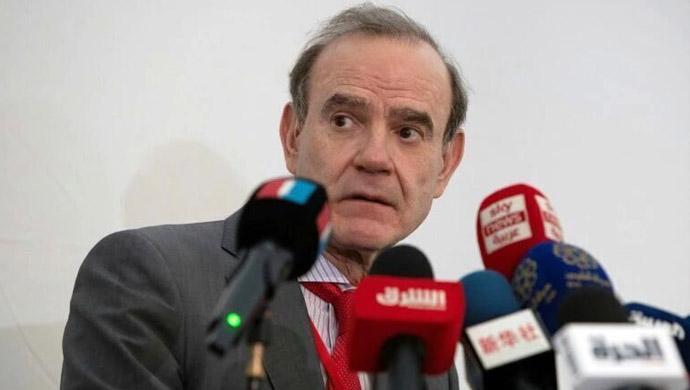Negotiations over Iran’s nuclear program are getting even more complicated. And it seems that no amount of concessions is going to revive the talks.
Indirect talks between US and Iranian officials brokered by the European Union in Doha, Qatar, ended without any progress on Wednesday, joining the lengthy and fruitless talks held in Vienna in previous months.
A US official who spoke to CNN said that, the talks were left in a stagnant spot, “which at this point means backwards.”
A State Department spokesperson later said, “We are disappointed that Iran has, yet again, failed to respond positively to the EU’s initiative and therefore that no progress was made.”
The State Department spokesperson said that despite having come to Doha to declare their readiness to quickly conclude and implement a deal on mutual return to full compliance with the JCPOA, the Iranian regime “raised issues wholly unrelated to the JCPOA and apparently is not ready to make a fundamental decision on whether it wants to revive the deal or bury it.”
A US official who spoke to Reuters said, “The prospects for a deal after Doha are worse than they were before Doha and they will be getting worse by the day. You could describe Doha at best as treading water, at worst as moving backwards. But at this point treading water is for all practical purposes moving backwards.”
The official confirmed that Iranian officials were making vague demands, reopening settled issues, and requests clearly unrelated to the JCPOA. The US official said that at this point, it is up to the Iranian regime to “resolve the fundamental question about whether they are interested in a mutual return to the JCPOA.”
“At this point, we are not sure if they (the Iranians) know what more they want. They didn’t come to Doha with many specifics,” he added. “Most of what they raised they either knew – or should have known – was outside the scope of the JCPOA and thus completely unsellable to us and to the Europeans, or were issues that had been thoroughly debated and resolved in Vienna and that we were clearly not going to reopen.”
The question is, if the regime doesn’t have the will to reach an agreement, why did it send its officials to Doha in the first place?
The regime faces two paths in respect to its nuclear program, each of which will end at the edge of a cliff.
The first option is for the regime to comply with the demands of the international community, downsize its nuclear program, shut down its uranium enrichment and ballistic missile program, and dismantle its network of terrorist groups in the Middle East and across the globe. Taking this path will cause the regime to lose its hegemony in the region and at home, and will lead to the unraveling and collapse of the regime, which is why senior regime officials call it the poison chalice.
The second option is to continue its escalation with the international community, double down on uranium enrichment, make maximalist demands in talks, and launch terror attacks to exude power. The regime will have to bear the growing pressure of more sanctions and prepare for being referred to the UN Security Council as a security threat under Chapter 7 of the UN Charter.
Regime supreme leader Ali Khamenei is trying to buy time to avoid either of the paths. He is playing the cat-and-mouse game, banking on the West’s appeasement policy to continue to kick the can down the road.
But he faces two key problems:
First, a year and half after nuclear talks began, even the most pro-appeasement politicians in the West agree that time is running out for the regime, which is why the Doha talks didn’t last more than two days.
Second, by dithering and wasting time, Khamenei is making it harder for his regime to return to any of the two paths.
This is Khamenei’s deadlock. He cannot enter any of the possible paths, and he’s running out of options to buy more time for his regime. And all the while, he’s making the prospects of the nuclear talks more dangerous.
As the Iranian Resistance had previously said, contrary to the regime’s wishes, a return to the full appeasement policy is no longer possible. Today, the tides are turning against the regime, and whatever choice Khamenei makes, he is making things worse for himself.





